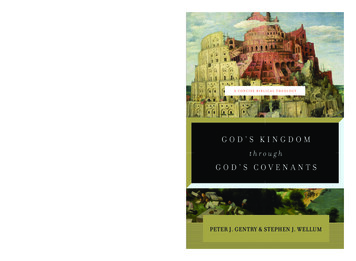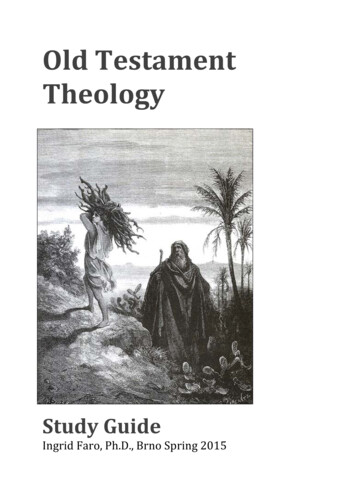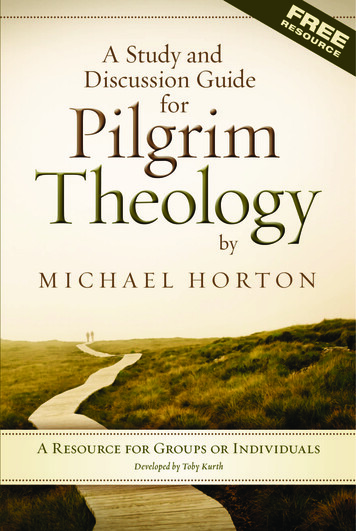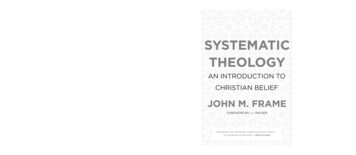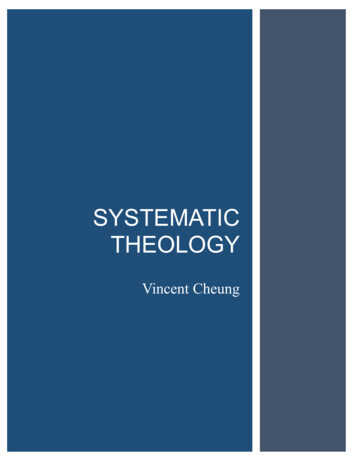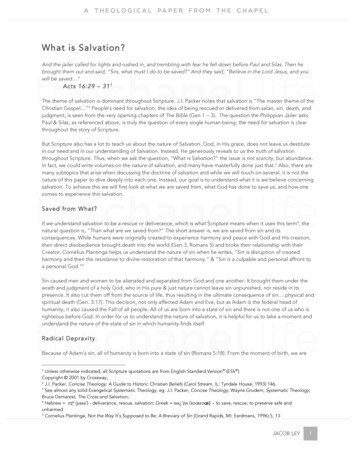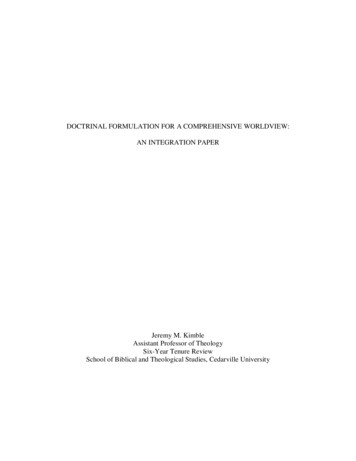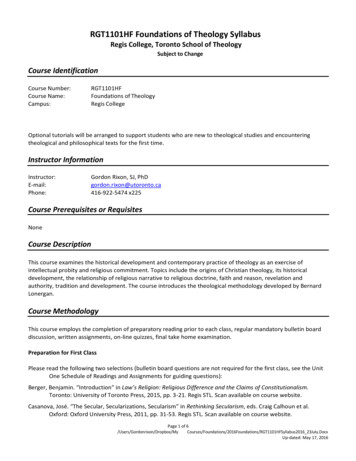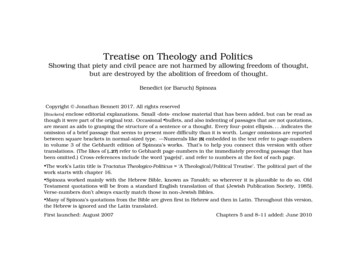
Transcription
Treatise on Theology and PoliticsShowing that piety and civil peace are not harmed by allowing freedom of thought,but are destroyed by the abolition of freedom of thought.Benedict (or Baruch) SpinozaCopyright Jonathan Bennett 2017. All rights reserved[Brackets] enclose editorial explanations. Small ·dots· enclose material that has been added, but can be read asthough it were part of the original text. Occasional bullets, and also indenting of passages that are not quotations,are meant as aids to grasping the structure of a sentence or a thought. Every four-point ellipsis. . . .indicates theomission of a brief passage that seems to present more difficulty than it is worth. Longer omissions are reportedbetween square brackets in normal-sized type. —Numerals like [5] embedded in the text refer to page-numbersin volume 3 of the Gebhardt edition of Spinoza’s works. That’s to help you connect this version with othertranslations. (The likes of [.27] refer to Gebhardt page-numbers in the immediately preceding passage that hasbeen omitted.) Cross-references include the word ‘page(s)’, and refer to numbers at the foot of each page. The work’s Latin title is Tractatus Theologico-Politicus ‘A Theological/Political Treatise’. The political part of thework starts with chapter 16. Spinoza worked mainly with the Hebrew Bible, known as Tanakh; so wherever it is plausible to do so, OldTestament quotations will be from a standard English translation of that (Jewish Publication Society, 1985).Verse-numbers don’t always exactly match those in non-Jewish Bibles. Many of Spinoza’s quotations from the Bible are given first in Hebrew and then in Latin. Throughout this version,the Hebrew is ignored and the Latin translated.First launched: August 2007Chapters 5 and 8–11 added: June 2010
Theology and PoliticsBenedict (or Baruch) SpinozaContentsPreface2Chapter 1: Prophecy8Chapter 2: The prophets17Chapter 3: The calling of the Hebrews. Was the gift of prophecy exclusive to the Hebrews?26Chapter 4: The divine law35Chapter 5: Why ceremonies were instituted, and faith in historical narratives—who needs it, and why?43Chapter 6: Miracles51Chapter 7: The interpretation of Scripture60Chapter 8: The Pentateuch and Joshua, Judges, Ruth, Samuel and Kings were not written by the people whosenames they bear. Were there several writers or only one? Either way, who?73Chapter 9: Questions about the historical books. Did Ezra put them into their final form? Are the marginal notesfound in Hebrew manuscripts variant readings?79Chapter 10: The remaining books of the Old Testament examined in the same way88Chapter 11: Did the apostles write their letters as apostles and prophets or rather as teachers? What the role ofthe apostles was.95Chapter 12: The true original text of the divine law. Why Scripture can be called ‘sacred’ and ‘the word of God’.Scripture as containing the word of God has reached us uncorrupted101Chapter 13: Scripture teaches only the simplest matters. It aims only at obedience, and teaches nothing aboutGod’s nature except what men can imitate by how they live107Chapter 14: What is faith? Who are the faithful? Settling the foundations of faith, and separating it from philosophy111
Theology and PoliticsBenedict (or Baruch) SpinozaChapter 15: Theology and reason: neither should be the handmaid of the other. Why we are convinced of Scripture’sauthority116Chapter 16: The foundations of the State, the natural and civil right of each person, and the right of the supremepowers1221
Theology and PoliticsBenedict (or Baruch) SpinozaPrefacePreface·S UPERSTITION·whole of nature is as crazy as they are.If men could manage all their affairs by a definite plan, orif they never ran into bad luck, they would never succumbto superstition. But often they are in such a jam that theycan’t put any plan into operation, and can only trust to luck,wobbling miserably between hope and fear. That makes themready to believe anything ·that will calm them down·; whenthey are in doubt, a slight impulse drives them this way orthat—especially when they are tormented by hope and fear,and don’t know which way to turn. At other times they areover-confident, boastful and presumptuous.Everyone knows this, I think, though I also think thatmost people don’t know themselves. We have all seen whatusually happens when things are going well: even men whoare quite inexperienced are so brim-full of cleverness thatthey take offence at being given any advice. And when timesare bad, men don’t know where to turn; they ask advice fromeveryone, and they follow it, however stupid and clumsy itmay be. They flail around, now hoping for better things andthen fearing worse ones, without having any real reasons.If someone who is knotted with fear sees an event thatreminds him of some past good or evil, he’ll take it to be asign of a future good or evil; so he’ll call it a ‘good omen’ or‘bad omen’ even if it deceives him a hundred times. Again, ifsomeone is amazed by a strange event that he sees happen,he’ll think it’s a sign of coming disaster, indicating thatthe gods are (or that God is) angry; which will lead himto think that he ought to placate them with sacrifices andprayers—an attitude that is full of superstition and contraryto ·real· religion. People are endlessly making up fictions,and interpret nature in amazing ways implying that theFrom all this we can see that the people who are most inthrall to every kind of superstition are the ones whose desiresare obsessively fixed on things they aren’t certain of. Theyall call for divine aid with prayers and womanish wailing,especially when they are in danger and can’t help themselvesout of it. Because reason can’t show them a secure routeto the hollow [Latin vana ] things they want—·things suchas money, fame, or power·—they call it blind, and regardhuman wisdom as useless [Latin vana ]. But they regard thedelusions, dreams and childish follies that their imaginationcomes up with as God’s answers ·to their prayers·. Indeed,they think that God snubs the wise and writes his decreesnot in the mind but in the entrails of animals! and that fools,madmen and birds foretell his decrees by divine inspirationand prompting. That’s how fear makes men insane.[5][6] So what makes superstition arise and grow is fear. Ifyou want a specific example, look at Alexander ·the Great·.He didn’t make use of seers in a genuinely superstitiousway until, at the ·mountain pass known as· the Susidangates, he had his first experience of being anxious aboutwhether his luck would hold, in a situation that he couldn’tcontrol. After he had defeated Darius ·in that battle·, hestopped consulting soothsayers and seers until the nexttime he was frightened. The Bactrians had gone over tothe other side, and the Scythians were challenging himto battle when he himself was laid up with a wound. ‘Helapsed back into superstition, that mocker of men’s minds,and ordered Aristander, whom he had put in charge of hisbeliefs, to perform sacrifices so as to learn what was going tohappen’ (quoted from Curtius’s Life of Alexander). There are2
Theology and PoliticsBenedict (or Baruch) Spinozacountless other examples, showing clearly that superstitiondoesn’t get its claws into men except when they are afraid; that what they worship in their illusory religion is nothingbut ghosts, the delusions of minds that are depressed andscared; and finally that it’s in times of great national distressthat seers have had the most control over the common people,and have been the most dangerous to their kings. That’senough about that; I think everyone knows all this wellenough.Some people think that superstition arises from a confused idea of God; but my account of the cause of superstition clearly implies three things about it: All men are naturally prone to it. Like all delusions of the mind and impulses of frenzy,it is bound to be fluctuating and intermittent, and It is kept up only by hope, hate, anger, and deception,because it arises not from reason but only from themost powerful affects.cursing and loathing them as the common plague of thehuman race.To avoid this evil ·of switching·, tremendous efforts aremade to embellish any true religion and [7] any empty cultwith so much ceremony and pomp that it will be seen asweightier than every ·other· influence and will be worshippedby everyone with the utmost deference. The Moslems havedone this so well that they consider it a sacrilege even todiscuss ·religion·, and fill everyone’s head with so manyprejudices that there’s no room left for sound reason or eventhe hint of a doubt.The greatest secret and whole aim of monarchic rule is tokeep men deceived, and controlled through fear cloaked in aspurious religious covering, so that they’ll fight for slavery asthey would for salvation, and will think it honourable ratherthan shameful to give their life’s blood so that one man canhave something to boast about. But in a free State that isthe worst thing one could plan or attempt. To fill each man’sjudgment with prejudices, or to restrain it in any way, isflatly contrary to common freedom.As for the rebellions that people stir up in the name ofreligion, they arise only because laws are made about matters of theoretical belief, opinions are condemned as wickedcrimes, and those who have the opinions are sacrificed notto the public good but to the hatred and barbarity of theiropponents. If the law of the State were such that only actionswere condemned and words went unpunished, controversieswouldn’t become rebellions and rebellions would lose theirappearance of high-mindedness. [Spinoza’s praise of the Dutch[In Spinoza’s usage, the noun ‘affect’ is a very broad term that coversall the emotions but also some dispositions or character-traits such ascowardice and greed.]Preface·Those three features of superstitionpretty clearly rule out the theory that it consists in a confusedidea of God·.It’s easy for men to be taken in by any kind of superstition,but it’s not easy for them to stay with one superstition·rather than rushing off to others·. The common peopleare always wretched, so they are never satisfied for long, andalways welcome anything new that hasn’t yet deceived them.This superstition-switching has been the cause of manyoutbreaks of disorder and terrible wars. What I have beensaying makes it clear, and Curtius says it neatly: ‘Nothingsways the masses more effectively than superstition.’ That’swhy they are easily led, under the pretext of religion, toworship their kings as gods for a while and then switch toRepublic is ironical; his opinions had already put him under pressure,Well,then, since we have the rare good fortune of living in arepublic where everyone has complete freedom of thoughtand is permitted to worship God as he sees fit, and in whichwhich would increase when this present work was published).]3
Theology and PoliticsBenedict (or Baruch) Spinozafreedom is valued more than anything else, I thought it wouldbe useful (and not unwelcome) for me to show not only thatthis freedom can be allowed without harm to piety and thepeace of the republic, but also that if it is abolished thepiety and peace of the republic will go down with it. [In thisPrefaceadherence to the Christian religion—i.e. to love, joy, peace,decency of conduct, and honesty towards all—quarrel sobitterly among themselves, and daily express their hatred forone another, so that a man’s religion is shown more clearlyby where and how he picks his quarrels than by his love,gladness, and so on. ·A person’s religious affiliations nolonger affect how he lives·. For a long time now, things havebecome so bad that you can hardly know what anyone is—whether Christian, Moslem, Jew or pagan—except by howhe dresses and grooms himself, where he goes to worship, which opinions he is attached to, or which teacher’s wordshe is given to swearing by. They all lead the same kind oflife!How did this bad situation arise? I’m sure that itsroot cause is the fact that the ‘religion’ of ordinary peoplehas involved their looking up to the clergy as respectable,well-paid, honourable members of society. For as soon asthis abuse began in the Church—·i.e. the abuse of regardingGod’s ministers as secure and affluent professionals·—theworst men immediately set about qualifying to perform thesacred tasks; the love of spreading divine religion degenerated into sordid greed and ambition; and the house ofworship became a theatre where one would hear not learned ecclesiastics teaching the people but orators aiming tocreate admiration for themselves, to censure publicly thosewho disagree, and to propagate only new and unfamiliardoctrines that the people would find striking. The onlypossible result, of course, has been dissension, envy, andhatred, whose violence doesn’t go down with the passage oftime.No wonder nothing remains of the old religion except itsexternal ceremonies, which evidently involve fawning on Godrather than worshipping him; no wonder there’s nothing leftbut credulity and prejudices. And what prejudices! Theyversion, the words pietas and pius will often be translated by ‘piety’ and‘pious’ respectively; but the thought they convey is always that of religiousduty—a ‘pious’ person is one whose conduct is in accordance with (andmotivated by) his religious duties—and occasionally the translation willreflect that fact.]·T HE OVER - ALL SCHEME OF THIS BOOK·The main thing I aim to show in this treatise is that freedomof opinion and worship is not harmful to the piety and peaceof the State but essential for them. This will require me todescribe the main prejudices about religion, i.e. the remnants of our former bondage, and then also the prejudicesconcerning the right of the sovereign. [That phrase translatesSpinoza’s summarum potestatum jus, which literally means ‘the right (orlaw, or duty) of the highest powers’. Similar phrases occur often in thiswork. The present version will use ‘authority’ to render the slippery wordjus in such phrases; remember that something’s having ‘authority’ isalways a matter of what it has a right to do, what it is entitled to do,or the like. And ‘the highest powers’ and some similar phrases will bevariously translated—e.g. as ‘sovereign’ or as ‘government’ or as ‘thosewho have sovereignty’—depending on what sounds best in the context.Many peoplebrazenly try to grab most of that authority for themselves,and to use religious excuses to turn the mob’s affectionsaway from the sovereign, so that everything will collapseback into slavery. (They could succeed, because the massesaren’t yet completely free of pagan superstition.) Beforetelling you in what order I’m going to show these things, Ishall first tell you what reasons have pushed me into writing.[8] I have often wondered that men who boast of theirThe concept that is involved is the same all through.]4
Theology and PoliticsBenedict (or Baruch) SpinozaPreface the natural light is not only disregarded but con-turn men from rational beings into beasts, because they won’t let anyone use his free judgment to distinguish thetrue from the false, and seem deliberately designed to putout the light of the intellect entirely. ‘Piety’. . . .and ‘religion’consist in absurd mysteries; and (this is the worst thing) thepeople who scorn reason and reject the intellect as inherentlycorrupt are just the ones who are thought to have the divinelight. If they actually had even a tiny spark of divine light,they wouldn’t go in for such pompous ranting, and wouldinstead get into the way of worshipping God more wisely,and would be notable for their love rather than, as now, fortheir hate. Their attitude towards those who disagreed withthem would be pity for people whose salvation they thoughtwas threatened, not hostility towards people they saw as adanger to their own position.[9] If they had any divine light, that would show upin their teaching, ·and it doesn’t·. They can’t have beenmuch impressed by the profoundly wonderful mysteriesof Scripture! I can’t see that they have taught anythingbut Aristotelian and Platonic theories, adjusted to squarewith the Bible so that they wouldn’t seem to be dedicatedpagans. Not content with joining the Greeks in craziness,they have wanted the prophets to rave along with them!This clearly shows that they don’t see—don’t even dream ofseeing—the divinity of Scripture. The more they wonder atthese mysteries, the more they show that they don’t believethe Bible—they merely say Yes to it. It’s also significantthat most of them base their understanding of Scripture onthe assumption that it is, sentence by sentence, true anddivine. So they bring to Scripture as a rule for interpreting it,something that ought to be learned from Scripture, througha strict examination with no fiddling of the results.When I weighed these matters in my mind—when I considered thatdemned by many as a source of impiety, human inventions are treated as divine teachings, credulity is considered as faith, the controversies of the philosophers are debated withthe utmost passion in the Church and in the State,and in consequence the most savage hatreds and disagreements arise,which men easily turn into rebellions—when I considered these and ever so many other things thatit would take too long to tell here, I resolved to examine Scripture afresh, with my mind clear and uncluttered, affirmingnothing about it and accepting nothing as its teaching exceptwhat it clearly taught me.·C HAPTER BY CHAPTER — THEOLOGY·With this resolve in mind I set about constructing a methodfor interpreting the sacred Books. In accordance with thismethod, I began by asking: What is prophecy? [chapter 1] How did God reveal himself to the prophets? Why were the prophets accepted by God?—becauseof their exalted thoughts about God and nature, orbecause of their piety? [chapter 2]Once I knew the answers to these questions, I was easilyable to determine that the authority of the prophets carriesweight only in its relevance to how we should live and betruly virtuous, while their opinions are of little concern to us.With that settled, I next asked Why were the Hebrews called ‘God’s chosen people’?[chapter 3]When I saw that the answer is ‘Because God chose for them acertain land where they could live securely and comfortably’,[10] this taught me that the laws God revealed to Moseswere nothing but legislation for the particular State of the5
Theology and PoliticsBenedict (or Baruch) SpinozaHebrews, that no-one else was obliged to accept them, andindeed that even the Hebrews were bound by them only solong as their State lasted.Next, to know whether Scripture implies that the humanintellect is inherently corrupt, I had to ask: Regarding universal religion, i.e. the divine law revealed to the whole human race through the prophetsand apostles—is it anything other than what is alsotaught by the natural light? [chapters 4 and 5] Are miracles events that conflict with the order ofnature? Are God’s existence and providence taught better—more certainly and clearly—by miracles than by thingswe understand clearly and distinctly through theirfirst causes? [chapter 6]In the explicit teachings of Scripture I found nothing thatcontradicts the intellect, ·i.e. contradicts the conclusionsyou could reach by thinking accurately without consultingScripture·; and I saw that the prophets taught only verysimple things that everyone could easily grasp, and that thestyle with which they decorated those things and the reasonsthey gave for them were aimed at moving peoples’ minds todevotion toward God. In the light of all this, I was completelyconvinced that Scripture leaves reason absolutely free, andthat it has no overlap with philosophy, so that each restson its own foundation.To demonstrate these things conclusively and get thewhole matter settled, I show how to interpret Scripture, andshow that for knowledge of it and of spiritual matters weshould look only to Scripture itself, and not to anything weknow through the natural light. [chapter 7] From this I moveon to showing what prejudices have arisen from the factthat the common people. . . .worship the Books of Scripturerather than the word of God itself. [chapters 8–11]PrefaceAfter this, I show that God’s revealed word isn’t a particular group of books, but rather a simple thought of thedivine mind that was revealed to the prophets: to obeyGod with our whole heart, by practising justice and lovingkindness [throughout this version ‘loving kindness’ will translate theLatin charitas]. And I show that this is what Scripture teaches,presenting it in a way that’s appropriate to the beliefs andintellectual level of those who would get it from the prophetsand apostles. The aim was for men to welcome the word ofGod with their whole heart. [chapters 12 and 13]After setting out the fundamentals of the faith [chapter 14],I conclude finallywhat Spinoza wrote next, conservatively translated: that re-vealed knowledge has no object but obedience, and that it isentirely distinct from natural knowledge, both in its objectand in its foundation and means.expressed a bit less compactly: that revealed knowledge isunlike natural knowledge in its basis, in the means fordiscovering it, and in its objective; the crucial point beingthat revealed knowledge tells us how to behave; so that ifall goes well it is obeyed, whereas natural knowledge sayswhat is the case; so that if all goes well it, it is true. Thoseare the different objectives: obedience in one case, truth inthe other.Revealed knowledge has no overlap with natural knowledge;each governs its own domain, without any [11] conflict withthe other. Some mediaeval theologians held that philosophyshould be subservient to theology, but in fact· neither oughtto be the handmaid of the other. [chapter 15]·C HAPTERBY CHAPTER — POLITICS ·Next, because men’s understandings vary greatly, because one man likes these opinions while another likes those,because what gives one man a religious inspiration makes6
Theology and PoliticsBenedict (or Baruch) Spinozaanother man giggle, I conclude that each person must beallowed to make up his own mind, being enabled to interpretthe foundations of the faith according to his own understanding. In judging whether a person’s faith is pious or not,we should consider only his behaviour, ·not the theologicalpropositions that he assents to·. This approach will enableeveryone to obey God with a whole and free heart, withnothing being prized except justice and loving kindness.After showing the freedom that the revealed divine lawgrants to everyone, I proceed to show not merely that thisfreedom can be granted without harm to the peace of theState or the status of the sovereign, but further that it mustbe granted, and can’t be taken away without great danger topeace and great harm to the whole republic.To demonstrate these conclusions, I begin with the natural right [jus] of each person, which extends as far as thatperson’s desire and power extend—·meaning that if youwant x and can get x then you have a right to x·. No law[jus] of nature obliges anyone to live according to someoneelse’s understanding; everyone is the defender of his ownfreedom. I show also that no-one gives up this right unlesshe transfers his power of defending himself to someoneelse; and that if there is some person or governmentalentity to whom everyone hands over his power to defendhimself and thus also his right to live according to his ownunderstanding, that person or government must necessarilyretain this natural right absolutely. [chapter 16. In that sentence,Prefacealone. [In that sentence, ‘sovereignty’ translates summum imperium But no-one can so completely giveup his power of defending himself that he stops being aman; so no-one gives up all his natural right; everyone keepsfor himself certain things—things to which he has a sort ofnatural right—that the State can’t take from him withoutputting itself in peril. These things are tacitly granted toevery subject unless they are explicitly recognized in anagreement between the subjects and the sovereign.From these considerations, I pass to the Hebrew State,which I describe at some length. My aim here is to showhow religion began to have the force of law, whose decreebrought this about, and various other things that seem worthknowing. [chapters 17 and 18] Then I show that those who havesovereignty are the defenders and interpreters not only of(1) civil law but also of (2) sacred law, and that they’re theonly ones entitled to decide not only (1) what is just and whatunjust but also (2) what is pious and what impious [chapter19]. Finally, I conclude that if those who have sovereignty areto retain their right and authority really [12] securely, theymust allow everyone to think what he likes and to say whathe thinks [chapter 20. Those last eleven words translate a quotation‘highest command’ or the like.]from the great Latin historian Tacitus; it occurs also in the title of chapter20, and on the title-page of Hume’s Treatise of Human Nature.].These, philosophical reader, are the things I’m offeringfor you to think about. You’ll give the work a good reception,I’m sure, given the importance and the usefulness of myline of argument, both in the work as a whole and in eachchapter. I could go on about this here, but I don’t want thispreface to grow into a book! Anyway, the main things ·that Imight add here in the preface· are points that philosophersalready know quite well. And I’m not aiming to recommendthis book to others ·who aren’t, at least to some extent,philosophers·, because there’s no hope of its pleasing them‘person or governmental entity’ translates a Latin pronoun that could beunderstood either way, leaving that question open. That can’t be done inEnglish, which uses ‘him’ for persons and ‘it’ for other things.]On this basis I show that those who have the sovereigntyhave the right to do anything that is in their power, that they alone are the defenders of right and freedom, and thateveryone else must act always according to their decree7
Theology and PoliticsBenedict (or Baruch) Spinoza1: Prophecywho are willing and able to think philosophically·—I thinkthat this work will be extremely useful.There’s something I need to declare, both here and atthe end of the work, so as to catch the eye of those whodon’t have time—or the desire—to read the entire work rightthrough. It is this: I gladly submit the whole of this book tothe examination and judgment of the governing authoritiesof my country. If they judge that anything in it conflicts withthe laws of the country or threatens the general welfare, Itake it back. I’m aware that I am a man and ·therefore· mayhave erred. Still, I have taken great care not to go wrong,and taken care especially that whatever I might write wouldbe entirely consistent with the laws of my country, with pietyand with morals.in any way! I’ve seen how stubbornly the mind is grippedby the prejudices that it has embraced under the guise ofpiety. I’ve seen also that the common people can’t be rescuedfrom superstition any more than they can from fear. And—winding this up—I’ve seen that the common people’s wayof being constant is to be obstinate, and that they aren’tgoverned by reason, but are bundled along into praising andblaming by their ·thoughtless· impulses. I’m not invitingthe common people to read what I have to say. . . . I wouldprefer them to neglect this book entirely, rather than stirringup trouble by interpreting it perversely—which is what theyusually do with everything. Reading it perversely won’t dothem any good, and will harm others who would philosophizemore freely if they weren’t blocked by the thought that reasonmust be the handmaid of theology. For them—·the readersChapter 1:Prophecy[15]·Prophecy—i.e. revelation—is the certain knowledge ofsomething that God reveals to men. And a prophet issomeone who interprets the things revealed by God to thosewho can’t have certain knowledge of them and can onlyaccept them through sheer faith. The Hebrew word for aprophet. . . .means ‘spokesman and interpreter’, but Scripture always uses it to mean ‘interpreter of God’, as can beseen in Exodus 7:1, where God says to Moses: ‘See, I placeyou in the role of God to Pharaoh, with your brother Aaronas your prophet.’ This amounts to saying: ‘Since Aaron willhave the role of a prophet who interprets to Pharaoh thethings you say, your role will be to play the part of Pharaoh’sGod.’·N ATURALKNOWLEDGE ·I’ll discuss prophets in Chapter 2; my present topic isprophecy. The definition I have just given implies thatnatural knowledge can be called ‘prophecy’. For the thingswe know by the natural light depend only on the knowledgeof God and of God’s eternal decrees. [Why not ‘. . . and of hiseternal decrees’? Because that treats God as a person, which Spinoza8
Theology and PoliticsBenedict (or Baruch) Spinozaso that their sensations and awareness were of an entirelydifferent nature from ours.But though natural knowledge is divine—·or anyway ofdivine origin·—those who teach it can’t be called ‘prophets’.1For what they teach are things that other men can perceiveand accept with as much certainty as they do, and in a waythat is just as respectable—and not as a mere matter of faith.Our mind contains a representation of the nature of God,and itself shares in that nature; and just because of that, it isable to form certain notions that explain the nature of thingsand teach us how to live our lives. So we can rightly maintainthat the nature of the ·human· mind, looked at in this way,is the first cause of divine revelation. For anything that weclearly and distinctly understand is (I repeat) dictated to usby the idea and nature of God—not in words, but in a muchfiner way that perfectly fits the nature of our mind. If youhave ever tasted the certainty of the intellect, you must haveexperienced this for yourself.That’s enough about the na
Theology and Politics Benedict (or Baruch) Spinoza Contents Preface 2 Chapter 1: Prophecy 8 Chapter 2: The prophets 17 Chapter 3: The calling of the Hebrews. Was the gift of prophecy exclusive to the Hebrews?26 Chapter 4: The divine law 35 Chapter 5: Why ceremonies were instituted, an
